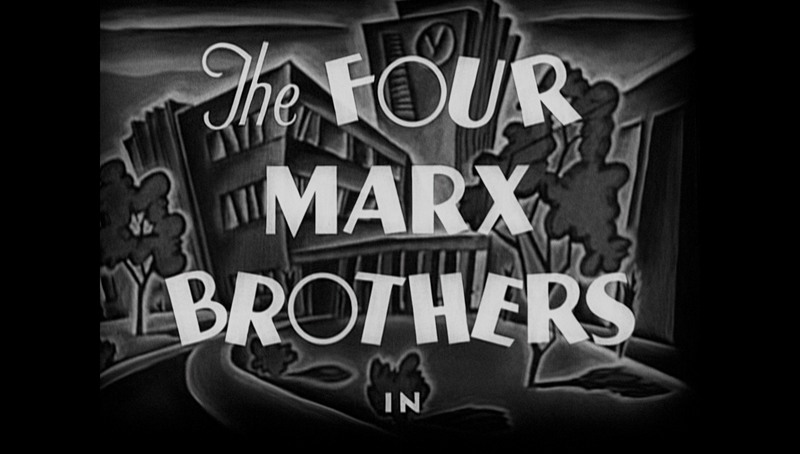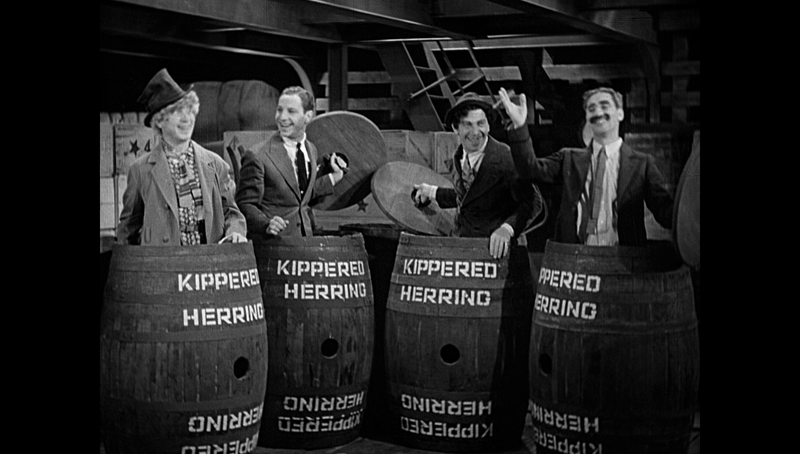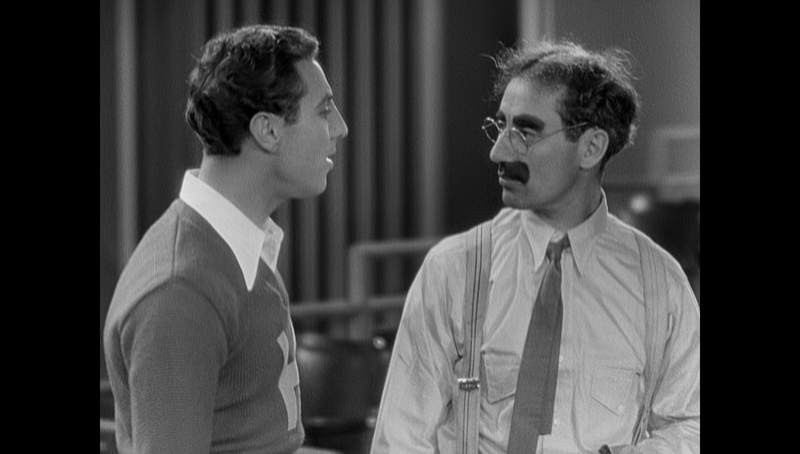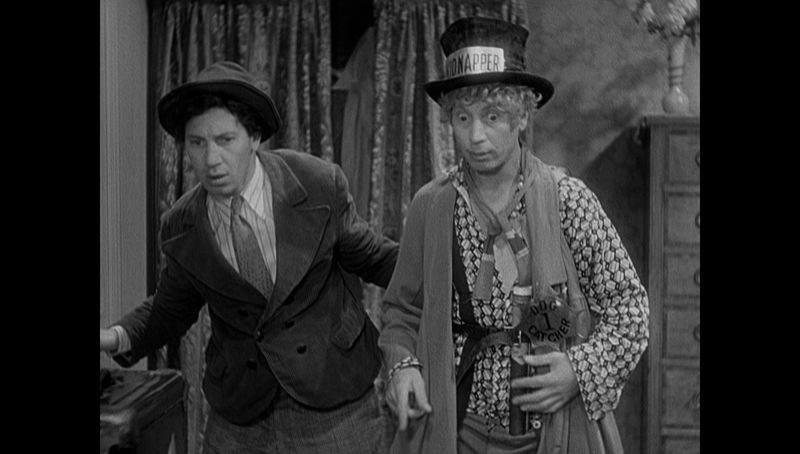| Reviews & Columns |
|
Reviews DVD TV on DVD Blu-ray 4K UHD International DVDs In Theaters Reviews by Studio Video Games Features Collector Series DVDs Easter Egg Database Interviews DVD Talk Radio Feature Articles Columns Anime Talk DVD Savant Horror DVDs The M.O.D. Squad Art House HD Talk Silent DVD
|
DVD Talk Forum |
|
|
| Resources |
|
DVD Price Search Customer Service #'s RCE Info Links |
|
Columns
|
|
|
Marx Brothers Silver Screen Collection - Restored Edition, The
The first five films from the classic four brothers

Loves: Smart comedy
Likes: Old-school comedy, The Marx Brothers
Dislikes: Needing subtitles, old-school musical songs
Hates: Misogyny
The Story So Far...
The Marx brothers, four real brothers who were hits on the vaudeville circuit, brought their mix of quick wit and physical gags to the big screen at the dawn of the talking motion picture, and wound up becoming some of the biggest stars in film comedy history by making some of the most beloved films ever. Though their combined cinematic output was somewhat brief, it was remarkably potent. Their films have received a number of releases over the years, including DVD box sets in 2004 and 2010, and DVDTalk has reviews of those releases.
The Movies
The Marx brothers may not have the cultural relevancy today that they had a few decades ago, but their influence continues to be felt, as their catchphrases and gags (and even their physical caricatures) reverberate through the creative people they've influenced through their films. That includes their first five films, The Cocoanuts, Animal Crackers, Monkey Business, Horse Feathers: and Duck Soup, some of which are considered among the greatest film comedies ever made, powered by the brothers' distinct on-screen personas and unique talents.
Groucho is inarguably the group's leader, and he often plays a character in a position of power of some sort. A fast talker, he is quick with a quip, insult or comeback, verbally pummeling whoever shares a scene with him to the point where it becomes a monologue at times because no one can get a word in edgewise, Even if a particularly pun doesn't land right, he fires so many that he's bound to draw a laugh soon after. And while wordplay is his weapon of choice, he's just as adept at physical comedy, with his exaggerated eyebrows and moustache (aided by heavy greasepaint) helping to sell the gag. A sarcastic agent of chaos, his aloof, detached behavior makes him capable of engaging with and commenting on any class of person and any situation, lending him a universality that serves him well as the films move from socialite parties to political parties.
A talented piano player, Chico may be the only one who can keep up with Groucho verbally, but he does so only because his simple, confused, stereotypically-accented replies stymie and frustrate his brother and keep their conversations at a manageable pace. Usually playing a schemer of some sort, Chico blends a down-to-earth reality with a ridiculous ignorance that allows for nonsensical puns to abound, like the famous "Why a duck?" routine. He's often paired with the curly-haired Harpo, the silent partner in the group, who communicates mainly through whistles and by honking a horn. A human cartoon with the facial elasticity of Martin Short, Harpo is not bound by reality, as he is capable of pulling anything from the pockets of his coat (be it a hot cup of coffee or a candle burning at both ends) and has a disturbing habit of chasing women--literally chasing them. Together, Chico and Harpo are a fantastic comedy pair, reaching perfection in Duck Soup, in a routine involving hats and a put-upon lemonade salesman that's brilliantly constructed.
There's also Zeppo, the fourth Marx brother, who bowed out after these films, moving on to his business interests. The least memorable of the group, with no gimmicks or stand-out characters, he usually plays the straight-man in the films. His performances were not indicative of a lack of talent though, as he was quite entertaining when given something to do, as seen in Monkey Business, where he mixed comedy and his ability to play a romantic lead to good effect. He just rarely got the chance to do so, often playing a subordinate role to Groucho, be it his assistant (Animal Crackers) or son (Horse Feathers). Oddly, a more important Marx brother than Zeppo was likely not a Marx, nor a brother, as Margaret Dumont was a key to several of these films, playing a woman of high society--the perfect foil for Groucho and company. Without her pomposity to deflate, the Marxes would be directionless whirlwinds, a point made clear in the two films here she didn't star in, Monkey Business and Horse Feathers, where Thelma Todd takes her spot, playing very different parts and bringing the film a very different energy.

Animal Crackers, like The Cocoanuts, was adapted from the stage, and features perhaps the best known musical number of the Marxes' career, the film-opening "Hooray for Captain Spaulding", which introduces Groucho's conquering hero, returning from Africa to be feted at a party thrown by Mrs. Rittenhouse (Dumont). There are a great deal of similarities between Animal Crackers and The Cocoanuts, including another series of schemes and another young couple in love, this time involving a valuable painting. Though the films are comparable, this movie shows how the Marxes learned from their first try in front of the camera and how they improved their act, getting sharper with the wordplay, while cutting back a bit on the musical elements (even if Chico and Harpo still get their instrumental spotlights.) We also get to see the emergence of Harpo's magic pockets, which are utilizes for a great wordplay gag of their own. Unfortunately, the story is still less important than the jokes, as all the plot is wrapped up in a rapid, abrupt ending (another hallmark of the Marx brothers' films.
Monkey Business, the first Marx brothers film written specifically for the screen, is the least story-focused, with an assortment of random segments built around the idea that the brothers, as stowaways aboard a ship, get involved in a rivalry between two gangsters, thanks to Groucho's interest in the one gangster's wife, and Zeppo's interest in the other's daughter. Marked mainly by the opening chase around the boat, involving all four brothers, a Punch & Judy scene with Harpo and some fine Groucho and Chico conversation, it's a bit too all over the place, even for the Marx brothers. Perhaps that's why Zeppo was able to take such a key role.
Horse Feathers is arguably the best of the films in this set, in close competition with the more critically-appreciated Duck Soup, featuring several outstanding examples of the Marx brother's genius, including the fantastic football game at the end of the movie. Groucho is named the president of Huxley College (how he manages to keep getting positions of authority is easily the biggest mystery of the Marx university) and he quickly goes to work improving the school, on the advice of his student son (Zeppo). Step one: improve the football team, which he fails to do when he misses out on hiring two ringers, and instead accidentally brings in Chico and Harpo, leading to campus chaos. Nothing shows the film's age better than the core concept of the brothers all lusting for the "campus widow" (Todd) an older woman who beds students (which apparently was a thing.) The best of the Marxes is on display though, including a great door entry sequence, some classic Harpo madness (like his wonderful "cut the cards" gag), a fun opening song and dance by Groucho, and that game, full of ridiculous trick plays. At just 78 minutes, it flies by, despite still featuring a Chico piano and a Harpo harp scene, but there are some problematic moments of misogyny present, which are rather aggressive in viewing the film today.
Duck Soup is one of most viewers' favorite Marx brothers' films, and that's for good reason. Groucho plays the new leader of the bankrupt country of Freedonia, installed by the country's main benefactor, Mrs. Teasdale (Dumont). While he goes about his wacky business (which consists mainly of conversations with Teasdale), Chico and Harpo are busy spying on Groucho on behalf of some revolutionaries seeking to take over the country. There are some amazing gems to behold in this movie, including what may be the greatest sequence in the group's careers, as Chico and Harpo annoy a lemonade salesman by messing with his hat. The sense of energy and spontaneity in this intricately performed bit are simply outstanding. Personally, the ending, which involves Freedonia going to war with the country of Sylvania, is overdone and somewhat repetitive, which brings it down a notch, but there's a lot to like in the Marx brothers' final Paramount film.
These films represent newly restored versions, which return the cuts made when the films were reissued in the 1930s, with edits required by censors. What this means is that some of the more suggestive material that had been excised previously is now back, like returning Animal Crackers to its appropriate length. Some material which was thought lost to censors was actually just lost to age and mistreatment of the original films, but these are the films in as close to original shape as is likely possible.

The Discs
The five Paramount films that make up "The Marx Brothers Silver Screen Collection - Restored Edition" are spread over three Blu-ray discs, with The Cocoanuts and Animal Crackers on the first disc, Monkey Business and Horse Feathers on the second, and Duck Soup on the third. The discs are held in a three-panel spot-UV coated digipak (featuring beautiful art on the inside), with discs two and three overlapped, while the first panel has a pocket for inserts. The digipak is held in a lightweight slipcase, which is embossed and spot-UV coated. Annoyingly, the only menu you find when popping in a disc is the film selection screen. Beyond that, you must use your pop-up menu button to access the options to watch the film, select scenes, check out the special features and adjust the set-up. There are no audio options, while English SDH and French subtitles are available.
The Quality
Let's be realistic for a moment. These films haven't received the most loving treatment over the years, and as a result, what we are left with are not exactly the most pristine materials ever. In fact, some material just simply doesn't exist anymore (one look at Horse Feathers and the scene with the brothers in Miss Bailey's room will show this, as there are several jump cuts thanks to frames having long since been destroyed.) In The Cocoanuts, there's heavy noise in some parts and the auction scene is a blown-out mess, compared to the rest of the movie, as it comes from a separate print--a move required to simply maintain its presence in the film. Meanwhile, the canoe scene in Horse Feathers is so jittery it looks like it was shot during an earthquake. All that said, overall, these 1080p, 1.33:1 transfers (naturally column-boxed) look very nice, with a minimal amount of dirt and damage--clean to the point where nothing stands out as obvious--and an impressive amount of fine detail (which, unfortunately, shows how some of the visual gags were pulled off, and which makes the greasepaint on Groucho more pronounced). Black levels are solid, and contrast is good,making for a pleasing viewing experience. There are some points where things get a bit soft, but whether that's from the source or smoothing ( Universal does have a reputation in such matters) is up for debate.
The films are presented with 2.0 DTS-HD Master Audio duped mono tracks, but unfortunately they can only do so much with audio from the early days of talking pictures (where stationary microphones meant some dialogue just wasn't captured clearly. As a result, much of the time I watched these films, I did so with subtitles on, to make sure I didn't miss anything (and, interestingly, the subtitles didn't exactly match what the characters said at times.) Singing with music (particularly by choruses) can be difficult to make out, and even some of the instrumentals (Harpo's harp in Horse Feathers in particular) sound very harsh and muddled. There have been some victories over the past, as traditional concerns like hiss and crackling have been cleaned out. For authenticity's sake, they sound like movies of their era.
The Extras
Each film is accompanied by a newly-recorded commentary by a film expert (or more than one in some cases), making the set a class in the Marx brothers. Because there's almost no crossover in participants between the five tracks, there is some repetition, as each person uses their time as an opportunity to share pretty much everything they know about the team's work. Heavy on trivia about the Marxes and the production of the films, they also touch on early film camera technique, the cast of the films, studio politics and business and, most helpful of all, they provide context for the films in connection to the time of their release, explaining cultural references that no longer resonate and pointing out where the films' pre-Code status allowed them to get away with material they would later be censored for. All of the commentators do a fine job, but critic F.X. Feeney and the tag team of Leonard Maltin and Marx Brothers historian Robert S. Bader are personal favorites.
Here's the track breakdown:
- The Cocoanuts: film scholar Anthony Slide
- Animal Crackers: film historian Jeffrey Vance
- Monkey Business: Bader and Harpo's son Bill Marx
- Horse Feathers: Feeney
- Duck Soup: Maltin and Bader
Held on the third disc with Duck Soup is the new 79:57 documentary The Marx Brothers: Hollywood's Kings of Chaos, which highlights the group's Paramount films and their careers in whole, via interviews with a number of participants, including David Mandel, Dick Cavett, screenwriters Larry Karaszewski and Scott Alexander, film professor Dr. Drew Casper, Groucho biographer Steve Stoliar and Groucho's grandson Andy Marx (in addition to the commentators on the films). Though it does travel down much of the same paths as the commentaries, it takes a clear, more narrative path through the Marxes' lives and careers, and the combination of the various perspectives (from expert to family to fan) makes for a cohesive picture of the men and their work.
The only carry-over from the DVD Silver Screen Collection is the only on-disc extra that set held: "Inside the NBC Vault - The Today Show Interviews". Running 16:45 combined (they can be watched together or individually), these three clips come from interviews in the ‘60s and ‘80s, as Harpo (1961), Groucho (1963) and Bill Marx (1985) spend a little time chatting. Harpo maintains his silence shtick, and also chases a female anchor around (an uncomfortable sight from the 21st century), while Groucho chats about Marilyn Monroe and the casting process, treating a female anchor in a way that would get him suspended from the show today. Bill Marx, promoting his book about his father, talks with Gene Shalit about his family, as shares some home movies, which show Harpo and Groucho in their downtime.
Also in the package is an attractive 12-page booklet (printed on heavy, glossy paper), titled "The Marx Brothers: From Vaudeville to Hollywood". The booklet is adapted from Bader's book, Four of the Three Musketeers: The Marx Brothers on Stage, tracing the group's relationship with vaudeville from their early days through their Hollywood stardom. As a primer for anyone new to the brothers, it's a quick and informative read.

The Bottom Line
Legends of film comedy, the Marx brothers were innovative comedians and big personalities, but their early films tended to be somewhat formulaic showcases for their immense talents, and from a more enlightened perspective, they can be uncomfortable to watch at times. That said, combined, their first five films are a highlight reel of truly classic comedy bits. This collection, which offers high-definition transfers of the films in newly-restored versions, likely looks and sounds as good as these movies ever will (for several reasons) and offers a nice spread of extras that should appeal to fans of the brothers' Paramount work. Considering the price, it's worth picking up for fans and newcomers alike.
Francis Rizzo III is a native Long Islander, where he works in academia. In his spare time, he enjoys watching hockey, writing and spending time with his wife, daughter and puppy.Follow him on Twitter
*The Reviewer's Bias section is an attempt to help readers use the review to its best effect. By knowing where the reviewer's biases lie on the film's subject matter, one can read the review with the right mindset.
|
| Popular Reviews |
| Sponsored Links |
|
|
| Sponsored Links |
|
|
| Release List | Reviews | Shop | Newsletter | Forum | DVD Giveaways | Blu-Ray | Advertise |
|
Copyright 2024 DVDTalk.com All Rights Reserved. Legal Info, Privacy Policy, Terms of Use,
Manage Preferences,
Your Privacy Choices | |||||||












